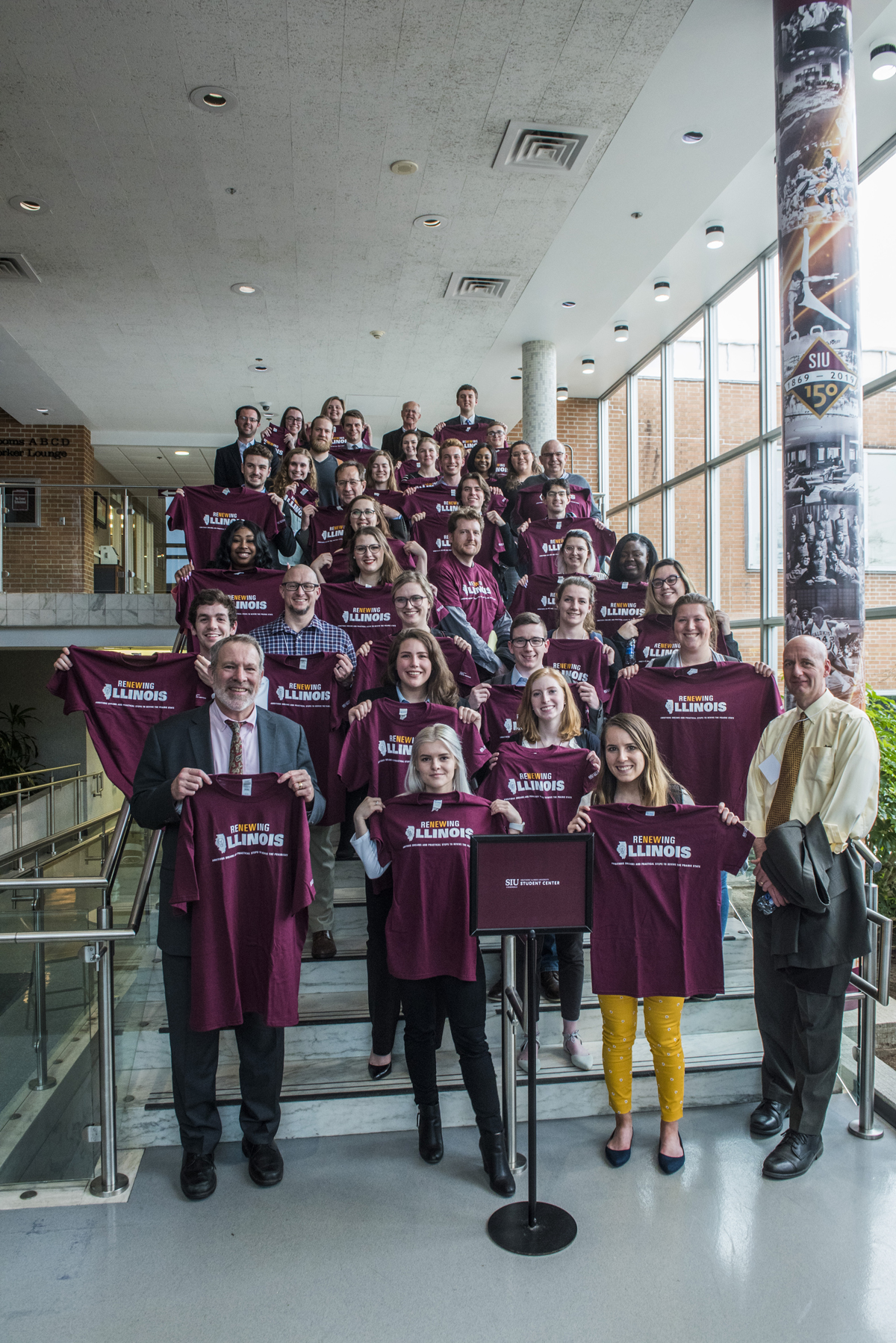
Ideas for “Renewing Illinois” – Nearly three dozen university students from across the state gathered at Southern Illinois University Carbondale in late March to come up with ideas to resolve some of the state’s problems and build a strong foundation for the future. (Photo provided)
April 29, 2019
Summit focused on ways to renew Illinois
Southern Illinois University Carbondale’s Paul Simon Public Policy Institute hosted its inaugural “Renewing Illinois” summit in late March and it inspired nearly three dozen university students from across Illinois to challenge our state’s political leaders to confront long-festering problems and build a strong foundation for the future.
At the conclusion of the two day summit, the students called on Illinois political leaders to enact fundamental reforms and warned that “delay is not an option.” The summit’s major findings were sent last week to Illinois Governor J.B. Pritzker, House Speaker Michael J. Madigan and Senate President John J. Cullerton.
Providing a ‘fresh and constructive perspective’
“Renewing Illinois Summit: Ambitious Dreams and Practical Steps to Revive the Prairie State” resulted in several conclusions, including that Illinois has “the potential for a remarkable future” in spite of a seemingly structural budget deficit and continuing population migration, said John T. Shaw, Institute director.
“Illinois badly needs new energy, fresh voices and unconventional thinking. I am convinced the Institute’s ‘Renewing Illinois’ summit and this report is going to be a helpful contribution to revitalizing Illinois,” Shaw said. “We were determined not to organize a conference that just enumerated the state’s problems but to find ways to generate positive ideas and a constructive way forward.”
A brief summary of the findings
- Illinois has “enormous potential” but has fallen into bad habits and failed to position itself for long-term prosperity. There is a need for a long-term solution, and students are willing to make sacrifices, including paying higher taxes, if it helps Illinois to “operate more effectively, create jobs, clean up the environment and revitalize” higher education.
- A “generation of can-kicking and gimmickry” that resulted in large state budget deficit must end. Policymakers need to determine essential government services to provide and generate revenue to pay for them.
- Additional revenues should go only toward essential services and sound investments, and greater transparency is required on budget and tax policy.
- Fundamental reforms are needed in the state’s higher education system to control rising tuition and fees, strengthen academic programs and encourage high school students to stay in Illinois for college. Illinois should find new ways to make in-state higher education attractive to Illinois high school students.
- There is a need for “better politics and smarter government.” That includes fairly drawn legislative districts created by a non-partisan entity, and civics and state history being taught “far more seriously and engagingly in Illinois schools.”
Students and faculty from nine universities participated
The students came from throughout the state and represented geographic and political differences, varied socioeconomic upbringings and diverse racial and cultural backgrounds, Shaw said. The summit provided a “crash course” on Illinois politics and history.
Another benefit was the opportunity to meet students from other Illinois schools who share a strong interest in the state’s future, Shaw said.
“Many of these students will be important leaders in the coming years and will use the contacts they developed in Carbondale to strengthen Illinois,” he said.
Participating universities were:
- Eastern Illinois University.
- Illinois State University.
- Illinois Wesleyan University.
- McKendree University.
- Northern Illinois University.
- SIU Carbondale.
- University of Chicago.
- Western Illinois University.
- Wheaton College.
Important for lawmakers and policymakers to hear a different voice
One the summit’s primary goals is giving a voice to the views of college students, many of whom will be faced with the decision to stay in Illinois or leave.
“Policymakers in Springfield are inundated with dense reports and turgid briefing materials from trade associations, lobbyists, and interest groups,” Shaw said. “But they rarely hear the views of college students who will soon decide whether to settle in Illinois and revive our state or depart for what many see as greener pastures.”
Shaw said the Institute plans to host this summit annually and have invited Gov. Pritzker and legislative leaders to attend future summits.
